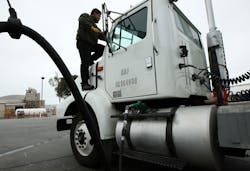The Federal Motor Carrier Safety Administration (FMCSA) and the Occupational Safety and Health Administration (OSHA) announced that they had signed a memorandum of understanding to share information that might allow both agencies to take enforcement action when a worker alleges safety problems, coercion or retaliation related to motor carrier operations.
Under the MOU, FMCSA will refer employees who complain of retaliation to OSHA, and OSHA will provide FMCSA with copies of complaints filed and findings issued under STAA. The agencies will report to each other annually on information shared during the previous year.
The agreement also provides that FMCSA will process OSHA requests for information from several FMCSA databases: The Driver Information Resource, Motor Carrier Management Information System, Enforcement Management Information System and Commercial Driver License Information System.
The MOU follows a March 2014 Government Accountability Office report concluding that OSHA and the Dept. of Transportation could collaborate better in areas where their whistleblower protection responsibilities overlapped. In the report, GAO acknowledged that OSHA and DOT already were discussing an agreement on motor carrier employees such as was already in place in the aviation and rail industries.
OSHA and FMCSA each have federal statutory authority related to worker coercion and retaliation.
Under the Surface Transportation Assistance Act (STAA), OSHA handles complaints filed by drivers, including independent contractors, mechanics, freight handlers or others directly involved with commercial motor vehicle (CMV) safety or security who allege they were fired, disciplined or discriminated against for engaging in certain protected activities, including:
- Reporting a safety violation
- Refusing to operate a vehicle due to a safety or health problem
- Accurately reporting hours of service
- Cooperating with a federal safety or security investigation
- Providing information to a federal, state or local regulatory or law enforcement agency related to an accident or incident resulting in death, injury or property damage
If OSHA finds that a complaint is valid, it can order the employer to reinstate the worker; pay back pay, interest and compensatory damages; pay punitive damages up to $250,000 where warranted; and/or take other remedial actions.
More recently, the 2012 transportation authorization act known as MAP-21 gave FMCSA specific authority to take enforcement action – such as civil penalties or revocation or suspension of operating authority – against carriers, shippers, receivers or brokers that coerce CMV drivers to violate federal safety or hazardous materials regulations.
In May, FMCSA proposed regulations to implement the anti-coercion legislation and added violations of commercial regulations as well as safety and hazmat rules. The notice of proposed rulemaking (NPRM) acknowledges that its proposed rule might overlap with OSHA’s responsibilities under STAA, but the agency said action by one agency didn’t preclude action by another in the same situation. OSHA’s mandate is protecting workers, while FMCSA’s mandate is safety, it said. And FMCSA can take action against a carrier or other entity but, unlike OSHA, it can’t compensate a driver. So a driver filing a complaint with FMCSA about coercion might be able to file a whistleblower protection complaint with OSHA and vice versa, FMCSA said.
OSHA has processed more than 2,800 cases under STAA over the last nine years. Some OSHA cases have resulted in orders that cost motor carriers hundreds of thousands of dollars in back pay and damages. For example, in May OSHA ordered an Iowa waste hauler to pay $123,203 in back pay, attorney’s fees and compensatory and punitive damages to a driver that OSHA said had been wrongfully terminated for refusing to join more than two people in a work vehicle that had only two seatbelts.
In November 2013, OSHA ordered Hickory, NC-based Gaines Motor Lines, which operates 61 trucks, to pay more than $1 million in back pay and compensatory and punitive damages in a case involving four drivers who had provided information to FMCSA during a safety audit. That order remains under appeal.
“Through this agreement, we are sending a clear message that silencing workers who try to do the right thing is unacceptable for workers and also unsafe for the public,” said David Michaels, Assistant Secretary of Labor for Occupational Safety and Health.
“Commercial truck and bus companies that knowingly endanger the motoring public, or retaliate against whistleblowing employees, will be prosecuted to the fullest extent of the law,” said FMCSA Administrator Anne Ferro.
